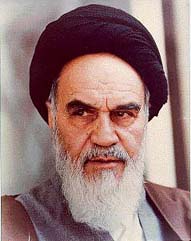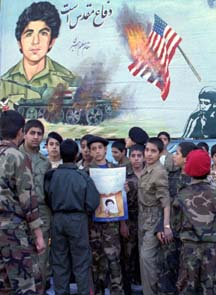| current issue |
| gay mundo |
| bush plus |
| race/class |
| nyc |
| africa |
| americas |
| asia |
| europe |
| arts series |
| gully español |
| about us |
| contact us |
| submit |
| subscribe |
| letters |
| archive |
| action resources |
| search |

The jilted foreign powers scorn the charismatic leader, less for his usual tyranny, than for his inexcusable faithlessness.
 Related Gully Coverage
Related Gully Coverage

Venezuelan President Hugo Chavez
The Colonial Script
by Kelly Cogswell
SEPTEMBER 13, 2000. A looming crisis in an election year is a boon or a boondoggle. This year's is oil. While the industrialized world's oil addiction and negligible planning are at the roots of the crisis, not OPEC policy, Washington, already antagonized by Venezuela's independent-minded President, Hugo Chavez, may well cast him as the villain. Big Oil (W. and Dick) will have its scapegoat, and even Clinton's V.P. (Al) will have a reason for getting caught with his environmentalist pants down.
That Old Colonial Script
The drama developing now in Venezuela is complex, but not entirely new. The tale of oil and greed, of a corrupt paper democracy overthrown by a charismatic, nationalistic leader, is shot from the same boilerplate colonial script collaboratively written over the centuries by British, French, Spanish, Russian, and American imperialist auteurs.
The first scenes are littered with foreign powers, a natural resource (oil, sugar, gold) of almost mythical stature, and tyrannical or corrupt rulers and a self-serving local oligarchy socking away plenty of profits.
In the middle, there is a vast quantity of extras yearning to be free, not to mention fed, and a messianic leader promising the huddled masses to exchange the shackles of foreign tyranny for the pinstripes of justice and prosperity. At the end, the jilted foreign powers scorn the charismatic and obnoxious leader, less for his usual tyranny, than for his inexcusable faithlessness.
Iran: Oil and Troubled Water
From about 1870, through the first half of the twentieth century, the history of the socially and politically fractious nation of Iran was characterized by the tug of war between Russia (and later the USSR) on its northern border, and Britain to its southeast in India.
Britain lurched to the lead when it found oil in commercial quantities in 1908 on leased Iranian land. Despite huge profits, the imperialist Britain, believing it was entitled to get something for nothing, paid impoverished Iran only a pittance.
After World War II, the Iranian legislature led by Dr. Mohammad Mossadeq began a kind of democratic revolution when it reasonably demanded oil profits be split 50/50 so it would have sufficient resources for development. Britain, raw and humiliated from the recent loss of its India colony, predictably refused to share a penny.
Mossadeq, by then Prime Minister, nationalized Iranian oil in 1951 (while promising full compensation), an act upheld as reasonable by the United Nations. But by 1952, Britain had frozen all Iranian assets in Britain, and instigated a de facto economic blockade of Iran by preventing the sale of Iranian oil.
Persuaded by the waning British colonials to step in, the United States deposed the duly-elected, but insufficiently pliant Mossadeq (the CIA's 'military specialists' in Teheran included the father of Gulf War brass General Schwarzkopf). The pliantly, pro-Western Shah monarchy thus reinstalled was then pumped for oil, oil, and more oil for the next two decades.
 While supported by the United States, the regime of Reza Shah became increasingly corrupt, tyrannical, and violent. It was ended abruptly by the understandably anti-American Islamic revolution led by the wildly popular, charismatic Ayatollah Khomeini, some of whose fanatic fundamentalist supporters, incidentally, had been funded and fostered by British intelligence to counter Russian, then later Communist, influences.
While supported by the United States, the regime of Reza Shah became increasingly corrupt, tyrannical, and violent. It was ended abruptly by the understandably anti-American Islamic revolution led by the wildly popular, charismatic Ayatollah Khomeini, some of whose fanatic fundamentalist supporters, incidentally, had been funded and fostered by British intelligence to counter Russian, then later Communist, influences.
Deja Cuba 1959
Substitute sugar for oil, and the U.S. for Britain, and Cuba was Iran all over again (see The Gully's Sugar Roulette). So it was no surprise when the revolutionary charismatic Castro instituted the 1959 Agrarian Reform Law to give Cubans more control of their own resources by expropriating large farms, with modest compensation.
Blithely unaware of the script's ending, an affronted President Eisenhower dutifully retaliated by slashing Cuba's sugar quota in 1960. Castro countered by threatening to take a mill for every pound cut from the quota. "We can lose our sugar quota and they [the Americans] can lose their investments," he quipped.
Both protagonists proceeded according to course until there were no sugar mills for the U.S. and no U.S. sugar quota for Cuba, and a disastrous economic blockade was set in place. The United States, of course, tried to depose and assassinate Castro, but he proved far more resilient than Mossadeq. In the end, like in Iran, a foreign power did leap in: but it was the Soviet Union.
You know the rest of the story.
Venezuela in the Wings
Disturbingly, many of the same pieces are falling into place for a similar showdown between the United States and Venezuela. Though the country's oil was officially nationalized in 1975, little of the huge profits trickled down beyond the corrupt, Miami-partying oligarchy, to the great majority of the country struggling with illiteracy and poverty.
In 1992, Colonel Hugo Chavez attempted a military coup and was imprisoned for his efforts. He reinvented himself in prison, and returned to the political scene engineering, in effect, a democratic revolution, by running for election on an anti-corruption, pro-development platform, and winning the overwhelming vote of his people—twice, first in 1998, again in 2000, since critics complained about the results of the first election.
Irritated by the loss of its Venezuelan friends in OPEC, the United States is now forced to watch Chavez meeting with Iranian and Iraqi leaders, not to mention his beloved neighbor Castro. While American truckers are not likely to take to the streets, or blockade refineries any time soon, the impending oil crisis could provide a good excuse to go after Chavez, at least rhetorically.
Like Mossadeq, the charismatic and frighteningly populist Hugo Chavez is historically ripe, if not for a coup, for convenient demonizing, even though the Saudis, with their huge oil reserves, actually have more influence in OPEC than Venezuela will ever have.
Changing the Political Script
 Given the outcomes of both the Cuban and Islamic revolutions, and the way Washington's strong-arm tactics backfired in both cases, Al and Joe, and W. and Dick should show some common sense and junk the dog-eared script when it comes to Venezuela.
Given the outcomes of both the Cuban and Islamic revolutions, and the way Washington's strong-arm tactics backfired in both cases, Al and Joe, and W. and Dick should show some common sense and junk the dog-eared script when it comes to Venezuela.
Like the other OPEC countries, Venezuela is a sovereign nation with its own goals, and national interests. Until the United States converts to a Communist economy, we have to acknowledge that it is in any nation's interest to sell less for more. It's hypocritical, and dangerous, to take their capitalism personally, especially when resentment of Chavez and OPEC blinds us to the larger, more complex issues causing the high prices and threatening the economy, not to mention the environment.
The real problem is that our own national interest has become equated with instant gratification. We hate to negotiate (and conserve, economize, and concede) almost as much as we hate to remember how our national greed, both corporate and popular, propped up the violent and the corrupt in Iran, Cuba, Venezuela, Haiti, Chile...
Can we change? 'Non-renewable' means we'll have to.
Related links:
For the Venezuelan point of view.
For everything you ever wanted to know About Crude Oil (Petroleum).
 The Gully In Depth
The Gully In Depth
New World
![]() Our Americas. Politics, democracies, failed utopias, and the sullen heirs of colonialism: from Canada to Argentina.
Our Americas. Politics, democracies, failed utopias, and the sullen heirs of colonialism: from Canada to Argentina.
Bush Plus
![]() All about the morass of U.S. politics, George W. Bush, Dems, Greens, GOPs, activists, silently irritated masses and global impact.
All about the morass of U.S. politics, George W. Bush, Dems, Greens, GOPs, activists, silently irritated masses and global impact.